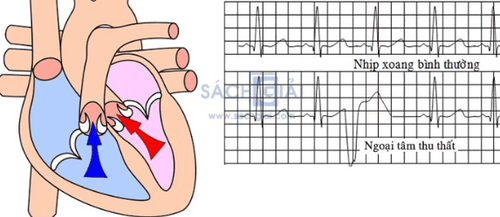Sintrom 4mg is an anticoagulant, used mainly to prevent and treat thromboembolic complications due to myocardial infarction, mitral valve disease, atrial fibrillation or deep vein thrombosis,... During the process of using the medicine, patients need to follow the correct dosage and usage instructions as instructed by the doctor to achieve the best results.
1. What medicine is Sintrom 4mg?
Sintrom 4mg is a drug belonging to the group of anticoagulants antiplatelets and fibrinolysis. The drug is researched and prepared in tablet form, manufactured by Novartis Farma S.P.A - Italy. Main ingredients of Symptom 4 is Acenocoumarol (content 4 mg), packaged in a box of 3 blisters x 10 tablets.
2. Uses of Sintrom 4mg
2.1. Indications for use of Sintrom 4mg medicine
Sintrom 4mg is mainly indicated for use in the following cases:
- Prevent complications thromboembolism do myocardial infarction, such as severe left ventricular dysfunction, wall thrombus, or embolic left ventricular dyskinesia during continuing replacement therapy for Heparin. In addition, Sintrom 4mg is also used to prevent recurrent myocardial infarction in patients who cannot use Aspirin.
- Used to prevent thromboembolic complications due to artificial valve disease, mitral valve or atrial fibrillation.
- Treatment for pulmonary embolism, deep vein thrombosis and relapse prevention when continuing replacement therapy for Heparin.
- Prevention of pulmonary embolism or venous thromboembolism in hip surgery.
- Catheter thrombosis prophylaxis.
2.2. Uses of the drug Sintrom 4mg serb
Pharmacology and main mechanism of action of Acenocoumarol ingredient:
- Acenocoumarol (4mg content) is effective anticoagulation, helps prevent and treat conditions involving blood clots. The nature of Acenocoumarol is a vitamin K antagonist, which plays a role in interfering with the mechanism of vitamin K reduction in the liver and synthesizing 4 blood clotting factors (including II, VII, IX and X).
- The indirect anticoagulant effect of Acenocoumarol works by blocking the synthesis of many clotting factors. After oral administration, Aacenocoumarol will lower blood prothrombin within 36 - 72 hours. After stopping the drug, the anticoagulant effect may continue for up to 2-3 days.
- In addition, Acenocoumarol also inhibits the formation and development of pre-existing thrombi. Thanks to that, symptoms of secondary thromboembolism are prevented even though this active ingredient does not have the ability to directly dissolve thrombosis.
Pharmacokinetics:
- Acenocoumarol is rapidly absorbed from the gastrointestinal tract and peak plasma concentrations are reached in 1 - 3 hours. The medication is strongly bound to plasma proteins, up to 97%, only the free part is active and metabolized. In addition, Acenocoumarol is also absorbed across the placenta and in breast milk.
- The elimination half-life of the drug will take place within 8 - 11 hours. Acenocoumarol will be excreted mainly in metabolized form through urine and a small part through bile (feces).
3. Dosage and how to use Sintrom 4mg serb
3.1. Dosage of Sintrom 4mg
Dosage of medication Symptom 4 will be determined based on the results of the patient's blood clotting time through the IRN test. Therefore, the dosage of the drug will be prescribed by the doctor depending on each patient, specifically:
- Young children: The use of Sintrom 4mg for children is still limited, however, if it is necessary to use the drug, the doctor will have to monitor the patient from the beginning to get the appropriate dosage.
- Adults: Take 4mg/day (first 2 days of use), check with your doctor the next day to determine the next appropriate dose.
- Elderly people: Use a smaller initial dose and only 3/4 or 1/2 of the adult dose.
3.2. How to use Sintrom 4mg
Sintrom 4mg is usually administered orally. Patients should take the medicine with filtered water.
In addition, patients should also take medicine Symptom 4 follow doctor's instructions and use at a fixed time of day. The best time to use Sintrom 4mg is in the evening. During drug use, patients need to monitor IRN to adjust the dose appropriately.
4. What to do in case of overdose or missed dose of Sintrom 4mg?
How to handle an overdose of Sintrom 4mg:
- In case of overdose of Sintrom 4mg, the patient may experience symptoms such as coughing or vomiting blood, bruising, abdominal pain, headache, nosebleeds, black or red stools, etc. When any of the above symptoms appear, immediately take the patient to the nearest local medical facility for timely examination and treatment. .
How to handle a missed dose of Sintrom 4mg: - If the patient accidentally forgets to take a dose of Sintrom 4mg within 8 hours, the patient can take the missed dose as soon as possible. However, if this time is exceeded, the patient should skip the missed dose and take the next dose according to the usual dosing schedule. If you miss a dose, you should also remember and notify your doctor for advice and support.
5. Side effects of Sintrom 4mg
When taking Sintrom 4mg, patients may experience some of the following common to rare side effects:
- Common side effects include itching, fever, rash, hair loss, nausea, diarrhea, individual joint pain.
- Rare side effects include unusual pain, swelling, nosebleed, paralysis, sudden shortness of breath, dizziness, localized skin necrosis, vasculitis, liver damage,...
In addition, you should immediately notify your doctor if the following symptoms appear: - Bleeding gums.
- Bleeding from the cut site takes a long time to stop bleeding.
- Longer menstrual cycle than usual.
- Numbness and tingling of the face, legs or arms.
- Pain, swelling or discomfort in the muscles.
- There are signs of a serious allergy such as difficulty breathing, hypotension, rash, swelling of the face or throat.
- Bleeding in the eyes, vomiting black fluid that resembles coffee grounds.
- Unconscious.
6. Be cautious when using Sintrom 4mg
Medicine Sintrom 4mg serb is contraindicated for use in the following cases:
- People who are allergic or hypersensitive to Coumarin derivatives or ingredients in the drug.
- People at high risk of bleeding, have recently had surgical intervention on the eyes and nerves or are likely to have surgery again.
- People with severe liver failure.
- Sufferer cerebrovascular accident.
- People with severe acute kidney failure (with creatinine clearance less than 20ml/min).
- People with progressive gastric and duodenal ulcers.
- Sufferer esophageal varices.
- People who are using high doses of Aspirin, systemic/vaginal Miconazole, Non-steroidal anti-inflammatory drugs Pyrazole, Chloramphenicol, Phenylbutazon or Diflunisal.
Some medications may interact with Sintrom 4mg, including:
- Drugs that increase the concentration/effect of Sintrom: Antibiotics (Norfloxacin, Ofloxacin, Ciprofloxacin, Tetracycline, Trimethoprim); antiarrhythmic drugs (Amiodarone); Acetaminophen (flu medicine, paracetamol); other anticoagulants (Enoxaparin, Calciparine or Heparin); antiplatelet drugs (Clopidogrel, Aspirin); antifungal drugs (Fluconazole, Ketoconazole); antihypertensive drug Nicardipine; non-steroidal anti-inflammatory drugs NSAIDS (Piroxicam, Voltarel); diabetes medication (Pioglitazone, Sulfonamide); anti-lipid disorder drug Gemfibrozil.
- Drugs that reduce the concentration/effect of Sintrom: Anticonvulsants (Carbamazepine); sleeping pills (Secobarbital, Phenobarbital); tuberculosis medicine (Rifampin); Aminoglutethimide.
While using Sintrom 4mg, patients need to note the following:
- Do not drink alcohol while using Sintrom.
- Follow the correct dosage and usage method as prescribed by your doctor.
- Do not diet or change your diet too much to adjust your body weight while taking the medication.
- According to experts, pregnant women should not use Sintrom 4mg, because this drug can directly affect the fetus, especially in the first and last 3 months of pregnancy. The use of Sintrom 4mg may lead to risks fetal malformations or miscarriage.
- Women who are breastfeeding should not use Sintrom 4mg. In case of necessity, children can be supplemented with vitamin K.
- People whose work requires high concentration such as operating machinery or driving vehicles should be cautious when using Sintrom.
- Avoid excessive activity or impact that causes injury/bleeding.
- Store Sintrom at room temperature, avoid exposure to direct sunlight and keep out of reach of children.
In summary, Sintrom 4mg is an anticoagulant, used mainly to prevent and treat thromboembolic complications due to some cardiovascular diseases. Patients need to take medication as prescribed by the doctor to increase treatment effectiveness and ensure health safety.
To arrange an appointment, please call HOTLINE or make your reservation directly HERE. You may also download the MyVinmec app to schedule appointments faster and manage your reservations more conveniently.
To arrange an appointment, please call HOTLINE or make your reservation directly HERE. You may also download the MyVinmec app to schedule appointments faster and manage your reservations more conveniently.








